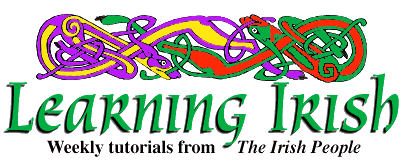
Irish Lesson 13
|
This week we return to consonants. You learned in Lesson 2 that each Irish consonant has two sounds: A broad sound if the nearest vowel in the word is "a", "o", or "u". A slender sound if the nearest vowel in the word is "e", or "i". Two closely related consonants, "p" and "b", are a good example of this. They are closely related because they are pronounced in the same way except that the vocal cords are vibrated for the "b" but mot for the "p". You can feel the vibration or humming in your vocal cords as you start to say "bet" but not as you start to say "pet". To pronounce broad "b" or "p", extend your lips much farther than for the English sounds and round the opening. Then pronounce the letter. Try: bád, bó, bun (bun), bláth (blaw*), blúire (BLOO-i-re), bróg, brú, brád, pá, post, punt (punt), plúir (PLOO-ir), práta (PRAW*-tuh). For the slender sound of "b" and "p", spread the lips somewhat, as if you were beginning to smile. Try: bean, beir (ber), bí (bee), bith (bi), bliain (BLEE-in), breá (bir-RAW*), bris (brish). Then try "b" next to "eo", which usually gets a (yoh) sound: beo (byoh), alive. You can now realize the clear difference in Irish between "brách" (braw*k*), meaning "ever", and "breá" (bir-RAW*), meaning "fine". "Erin go bragh" is actually a badly anglicized form of "Éire go brách", meaning "Ireland forever". In going from a broad "b" or "p" sound to a slender vowel such as "i", you will naturally make a sound somewhat like English "w". Try: buí (bwee), bain (bwin). Notice that the "u" and "a" in these words are there chiefly to tell you to make the broad "b" sound instead of the slender, as in bí (bee), beir (ber). Last, try: buíochas (BWEE-uhk*-huhs), thanks. The sounds for "m" are akin to those for "b", except that air is expelled through the nose for "m". Protrude and round the lips, then try: mó (moh), mór (mohr), má (maw*), mála (MAW*-luh) múch (mook*), múin (MOO-in), mná (muh-MAW*), mura (MUR-ruh). For slender "m", hold the lips as for slender "b" and "p" Try: mín (meen), minic (MIN-ik), méad (may*d), Meiriceá (MER-i-kaw*). VOCABULARY Masculine nouns bricfeasta (brik-FAS-tuh), breakfast lón (lohn), lunch tae (tay*), tea trí bhéile bidh (tree VAY*L-uh bee) three meals práta, na prátaí (PRAW*-tuh, nuh PRAW*-tee), potato, the potatoes Feminine nouns feoil, an fheoil (FYOH-il, un OH-il), meat mias, an mhias, na miasa (MEE-uhs, un VEE-uhs, nuh MEE-uhs-uh) dish, the dishes Verbs faigh (feye), get cuir (kir), put ith (i), eat téigh (tay*), go nigh (ni), wash Other words réidh (ray*), ready DRILL To help you learn the difference between "is" and "tá", do the following drill, either alone or with classmates:
Repeat this for at least ten objects or persons. Some words are: arán, feoil, bainne, uisce, cupán, spúnóg, fear, bean, cailín, páiste, feirmeoir, dochtúir, lámh, súil. REFLEX EXPRESSIONS Here are additional expressions that you should learn for quick use in conversation and thought. Ceart go leor (kart goh lohr), Right enough Isteach leat anois (ish-TYAHK* lat uh-NISH), In with you now. Ar chor ar bith (er HUHR er BI), at all. (Put at sentence end.) CONVERSATION Seán: An bhfuil an bricfeasta réidh? (un vwil un brik-FAS-tuh ray*) Is the breakfast ready? Bríd: Tá, ach níl na miasa ar an mbord fós (taw*, ahk* neel nuh MEE-uhs-uh er un mohrd fohs) It is, but the dishes are not on the table yet. Cuir ar an mbord iad (kir er un mohrd EE-uhd). Put them on the table. Seán: Déanfaidh mé sin (DAY*N-hee may* shin). I'll do that. Bríd: go raibh maith agat (gu-ruh MAH huh-guht). Tá mé an-ghnóthach anois (taw* may* AHN-gnoh-huhk* uh-NISH). Faigh spúnóg mhór dom (feye spun-OHG vwohr duhm), más é do thoil é (MAW* shay* duh HIL ay*). Thank you. I am very busy now. Get me a big spoon, please. Seán: Seo duit é (shuh git ay*). Here it is. Bríd: Go raibh maith agat (gu-ruh MAH huh-guht). Cad ba mhaith leat le haghaidh an dinnéir? (kahd buh vwah lat le HEYE-ee un din-YAY*R) Thank you. What would you like for dinner? Seán: Ba mhaith liom feoil, prátaí, agus cabáiste (buh vwah luhm FYOH-il, PRAW*-tee, AH-guhs kuh-BAW*SH-te). I would like meat, potatoes, and cabbage. Nach maith an dinnéar é sin? (nahk* mah un din-YAY*R ay* shin) Isn't that a good dinner? Bríd: Nach agatsa atá an ceart? (nahk* uh-GUHT-suh uh-TAW* un kart) Aren't you the one who's right? (c) 1997 The Irish People. May be reprinted with credit. |